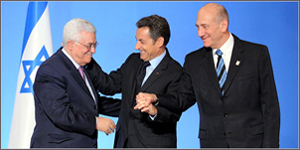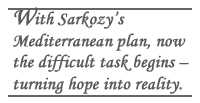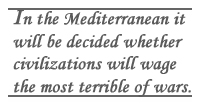Mediterranean Pomp
Mediterranean Pomp

PARIS: In the middle of July many Parisians may have been en vacances, but heads of states and governments of Mediterranean countries gathered here for a summit at the invitation of President Nicolas Sarkozy. With heads of state from both north and south present, the final summit could be viewed as a success. Israeli and Palestinian leaders celebrating their willingness to strive for peace made for good photo opportunities. But on the home stages those leaders are weak – and now the difficult task begins – turning hope into reality.
Otherwise the first summit of a Mediterranean union may turn out to be pomp without substance.

While nobody doubts the critical strategic importance of the region rich in oil and mired in historic conflict, the plan to develop multifarious cooperation without settling the core Israeli-Palestinian dispute amounts to putting the cart before the horse.
The first time Sarkozy spoke about this project was during his presidential electoral campaign in February 2007. He mentioned it again in May, after his election, then in late August, in his first global speech on diplomatic issues at the opening of the French Ambassadors’ Conference. But he remained elusive and avoiding specifics, even if this project was presented as a priority of his presidency.
Some observers were dubious. They thought that this project was aimed at softening Sarkozy’s self-proclaimed image of “Israel’s friend” in Maghreb countries. These countries were also alarmed by Sarkozy’s ongoing fight on immigration. On the domestic politics front, Sarkozy had infuriated the French Arab community by drawing a link between insecurity, troubles in the suburbs and young boys of Arab or Muslim origin living there.

In a speech given in Tangier on October 23 last year, Sarkozy officially proposed a Mediterranean Union. Once again, he stated his belief that what happens in the region is not only crucial for its residents, but also for the rest of humankind. According to Sarkozy, it is “in the Mediterranean that will be decided whether or not civilizations and religions will wage the most terrible of wars, whether or not the North and the South will clash, whether or not terrorism, fanaticism and fundamentalism will succeed in imposing their violence and their intolerance.” One could not emphasize the central strategic dimension of that area in a clearer way.
Thereby, Sarkozy makes the Mediterranean rim the epicentre of the North-South relations and of the Muslim world and the West. Inspired by the achievements of the European Union, Sarkozy wants to make strides by implementing concrete cooperation and projects. It is true that, at first, the creation of the European Community was based on the idea of pooling coal and iron – strategic resources in 1951 – by France and Germany. As Jean Monnet put it, the aim of such a process was to “make war unthinkable and materially impossible” for countries that used to fight against one another. The European Community did not start with a global plan; it started with a few empirical projects, and then turned out to be something that stretched far beyond the initial expectations.
Sarkozy does not want to imitate the European institutional pattern, but the practical approach that led to its creation. He puts forward the idea of a diversified Mediterranean area where the common projects would concern the contemporary equivalents of coal and iron – environmental issues, energy, transportation and water. It would be, as Sarkozy stated, a “union of projects.”
According to some observers, the plan appears visionary. Others blame it for being too vague. His approach raises a few questions: How would this plan differ from the Barcelona Process, launched by Euro-Mediterranean foreign ministers in 1995, already blocked by the Israeli-Palestinian conflict? When he compares his plan to the European example, Sarkozy argues that the European Community was not based on the expiation of the Germans, and instead, he says, Europeans, envisioned the future. The president was right considering that one should not constantly live in the past and repentance. However, if Europe managed to reconcile after WWII, it was because Germany did reckon with the Nazi crimes.
Most of all, Europe succeeded because it was at peace. The common projects consolidated peace, but peace existed in Europe before these projects. Sarkozy’s project must determine what kind of common projects could involve both the Israelis and the Palestinians. Is it possible for the Arab countries and Israel to engage themselves in such projects without having first resolved this conflict? Cleaning the Mediterranean Sea of pollution, for instance, would benefit everybody in the area. Yet, how do shared benefits emerge, considering the Palestinians lack access to the sea and Lebanon still suffers from the ecological disaster caused by its war with Israel last year?
If, as Sarkozy correctly emphasizes, the Mediterranean region indeed has huge strategic importance, it is precisely because of the Israeli-Palestinian conflict, a conflict that lies at the heart of the relationship between the Muslim world and the West. As long as the conflict goes unresolved, Sarkozy’s ambitious plans confront obstacles.
This is certainly the main flaw in the president’s approach: He wants to speed the process so as not to be blocked by the Israeli-Palestinian issue, but as long as this problem exists, it’s difficult to do anything major. No matter how useful all the cooperation projects may be, they won’t overcome the central conflict, nor can they hide nor make up for the absence of peace there.
Sarkozy is presented as one of Israel’s closest friends. He’s never been in the Palestinian territories. He has stated many times that Israel’s security is of the utmost priority, and he has never expressed much concern over the fate of the Palestinian people.
Yet, Sarkozy’s positions on this issue seem to have evolved recently. He now makes a link between the development of terrorism and the fact that the Israel-Palestinian conflict is still not solved. He warns that the continuation of the conflict will play in favor of Islamism, Hamas, Hezbollah and Iran. Therefore, a fair solution is needed to keep these extremist movements from increasing their political impact.
Usually, Israel’s closest friends avoid drawing such a link between the development of radical Islamism and Israeli-protracted occupation of Palestinian territories.
But Sarkozy must also fight on another front, the European one. If, at first, European leaders were grateful to Sarkozy for putting an end to the European treaty deadlock thanks to the promotion of the so-called “mini-treaty,” they are now a little upset by his methods. They tend to consider him as self-centered when he tries to present himself as the main, if not the only reason for that success. His handling of the release of the Bulgarian nurses from Libyan jails – attributing the outcome to his work and dismissing European collective efforts – irritated his Europeans colleagues. For that reason and others, bilateral relations with German Chancellor Angela Merkel are in trouble.
Sarkozy is considered a free rider, not playing for the team. The same is said about the Mediterranean project. It’s perceived as a French national project, launched without consultation within Europe.
Earlier, Jean-Pierre Jouyet, Secretary for European Affairs, warned that the Mediterranean project is on the wrong path, perceived as a competitor to other existing European projects including the Barcelona process and the neighborhood policy.
Grandiose projects, like charity, must begin at home, and for Sarkozy, Europe is that home.
Pascal Boniface is director of the Institute for International and Strategic Relations (IRIS). He has published or edited more than 40 books on French foreign policy, nuclear affairs and other strategic issues.